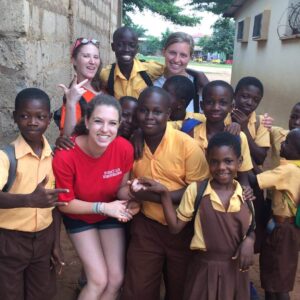by The Cowl Editor on February 3, 2017
News

By Sabrina Guilbeault ’18
Assistant News Editor
Creating sustainable, collaborative, and innovative aid that fosters empowerment, education, and self-sufficiency is the mission of the Global Sustainable Aid Project (GSAP), and since 2010, Providence College students have been given the opportunity to see this mission play out in action in Ghana.
Led by Dr. Stephen Mecca, the Maymester class in Ghana offers students three academic credits and fulfills the civic engagement proficiency at the college.
“This Maymester course is a unique opportunity to have three professors teaching students to analyze the social value of complex problem solving in the devloping world from a systems, ethical, and business approach,” said Dr. Terence Goldrick, a professor of theology who will teach the class for the first time. He explained he is excited to have the support of the PCSB for ethics. “The course is an example of our shared conviction that business is a force for the common good in partnership with the liberal arts and sceinces,” he said.
“I had the opportunity to talk to Dr. Mecca at the Study Abroad Fair in the fall of last year, and I was immediately drawn in by the sustainability focus and with the initiatives that we would work on while we were in Ghana,” said Gabriella Dess ’18, who participated last year. “I appreciated the fact that Dr. Mecca has had a very thoughtful and involved relationship with the group of Ghanaians and that he knows their lifestyle and knows how we can most effectively work with them to help them achieve their goals.”
Claire Kleinschmidt ’17, a physics and engineering student, has worked with Dr. Mecca for seven semesters and explained how being involved in an interdisciplinary lab dedicated to finding sustainable solutions for the developing world has shaped her college experience.
“This Maymester gave me the opportunity to intern in Ghana at GSAP and implement the research I’ve been working on and see how it is being used to empower entire communities,” she said.
The program, which also includes pre-departure briefings, advanced readings, and post travel reflections, involves two weeks in Ghana where students will work on projects through GSAP.
This year’s program will focus on improving literacy rates in schools and implementing inexpensive and effective interventions to improve water, sanitation, and hygiene.
One project, the GSAP Microflush Toilet, was created by Dr. Mecca, and is an “off-grid, sustainable, environmentally friendly, low cost, odor- and fly-free toilet that reuses one cup of greywater from a previous user’s hand wash to isolate waste and flush the toilet.”
Microflush toilets are often built near two to three households, so that multiple households can share a toilet, bringing the cost down further.
“I spent a few days in the field working with others on building the Microflush toilet,” said Nicole Mills ’17. “As a business major, I teamed up with one of the students from Ashesi University in Ghana to work with and learn about the lender model which allows those we train on how to build toilets to develop their own business and a sustainable income.”
She mentioned that students should not let their major stop them from applying, because there is a place in the program for everyone.
Dess explained that she and other students went into schools and identified what areas needed improvement, including handwashing and literacy. “We worked to improve their school libraries, and implement a more effective and useful system,” she said.
She gave an example of how in one library termites had eaten shelving, and once the shelves were all taken down and replaced, students worked together to organize books into different categories, and the students in Ghana were encouraged to continue reading and learning while at home.
“Meeting peers from Ghana and working together on these projects is going to be the kind of transforming experience study abroad is meant to be, instead of academic tourism,” said Dr. McGoldrick.
Reflecting on her experience, Mills said, “When I came home, everyone asked me if I had fun, and I never wanted to say it was fun, because it wasn’t. We were living in rural conditions, in extreme heat, doing hard work, and some of us got sick.”
Still, she noted just how beneficial the trip was. “Whether it was talking to one of the students from the University of Ghana and learning about their culture, touring the country, or even putting a toilet together, the trip helped me in some way.”
Applications for the program this May are available online. The application is due on Feb. 14, or until positions are filled, and final notices of acceptance will be made in late February.
“Something I am very glad I discovered there was the importance of empowering others to mobilize themselves and that this type of community organizing takes a lot of work,” said Dess. “I would have liked to have done more while I was there, but it is a difficult and intensive process to achieve long term results.”
She explained that the program is applicable to students who are interested in global health and students wishing to see first-hand how implementing sustainable projects can yield long term and positive results.
“I was incredibly moved by the faith so many Ghanaians held dear and the vibrancy of their culture,” said Kleinschmidt. She explained how the program will push students to think beyond their Western worldview and learn to embrace life in a rural, developing village.
Reflecting on her experience, Kleinschmidt stated, “This program has helped me be so much more grateful and intentional about who I am and what I choose to spend my time doing. Go.”